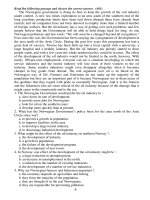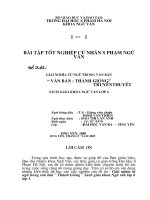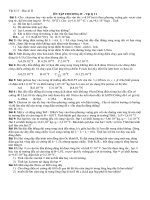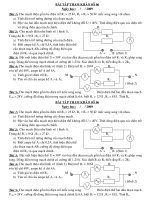Bai tap Olympia lan 5
Bạn đang xem bản rút gọn của tài liệu. Xem và tải ngay bản đầy đủ của tài liệu tại đây (123.63 KB, 21 trang )
Read the following passage and choose the correct answer. (441)
The Norwegian government is doing its best to keep the growth of the soil industry
under control. A new law limits exploration to an area south of the southern end of the
long coastline; production limits have been laid down (though these have already been
raised); and oil companies have not been allowed to employ more than a limited number
of foreign workers. But the oil industry has a way of getting over such problems, and few
people believe that the Government will be able to hold things back for long. As one
Norwegian politician said last week: “We will soon be a changed beyond all recognition.”
Ever since the war, the Government has been carrying out a programme of development in
the area north of the Artic Circle. During the past few years this programme has had a
great deal of success: Tromso has been built up into a local capital with a university, a
large hospital and a healthy industry. But the oil industry has already started to draw
people south, and with a few years the whole northern policy could be in ruins. The effect
of the development of the oil industry would not be limited to the north, however. With
nearly 100-per-cent employment, everyone can see a situation developing in which the
service industries and the tourist industry will lose most of their workers to the oil
industry. Some smaller industries might even disappear altogether when it becomes
cheaper to buy goods from abroad. The real argument over oil is its threat to the
Norwegian way of life. Farmers and fishermen do not make up the majority of the
population but they are an important part of it because Norwegians see in them many of
the qualities that they regard with pride as essentially Norwegian. And it is the framers
and the fishermen who are most critical of the oil industry because of the damage that it
might cause to the countryside and to the sea.
1. The Norwegian Government would prefer the oil industry to …
a. slow down its rate of development.
b. provide more jobs for Norwegians
c. look for oil on the southern coast
d. develop more quickly than at present.
2. What has the Norwegian Government’s policy been for the area north of the Artic
Circle since war?.
a. to prevent a growth in population.
b. to improve facilities in the area.
c. to develop a large tourist industry.
d. to discourage industrial development
3. What might be the effect of the oil industry on northern Norway ?.
a. the development of industry
b. a growth in population.
c. the failure of the development program.
d. the development of new towns
4. In Norway, one effect of the development of the oil industry might be …
a. a large reduction in unemployment.
b. an increase in unemployment in the north.
c. a reduction in the number of existing industries.
d. the development of a number of service industries.
5. Why are Norwegian farmers and fishermen important ?.
a. the economy depends on agriculture and fishing
b. they form the majority of the population.
c. they are thought of as the real Norwegians.
d. they are responsible for preventing pollution.
-1-
Read the passage (True or False) (426)
More apples are harvested in the United States than any other country in the world; the
amount far exceeds that of France, the number two country in the world list.
It could be that this is why the word ‘apple’ features in a whole range of America
expression including the famous old saying ‘in apple- pie order’ while a ridiculous
assertion is apple sauce. A scheme or plan that can be overturned unexpectedly is an apple
cart. Then there was the dance, the Big Apple, which was a big hit in the 1930s. this name
was also given by jazzmen, to the city of New York, and this name has continued up to the
present day. Apples are valued nowadays for an aid to digestion and their ordinary apple
only contains 85 calories.
1. The United States is the world’s leading country in the harvesting of apples……
2. Although France is prominent harvester of apples, the United States’ harvest is much larger.
3. Many different American expressions are about apple- pie…
4. To be in apple- pie order means to be in fair condition…
5. An apple cart may be overturned unexpectedly…
6. The Big Apple was the name given to New York in the 1930s…
7. Apples are worth a lot of money nowadays…
8. While an apple is good for our health it does contain the large sum of 85 calories…
9. Apple sauce can refer to an absurd statement …
10. There are many schemes and plans that can be overturned…
Read the following passage and choose the correct answers (391)
Wood has long been a popular building material in North America because it has
generally been plentiful and cheap. Swedish settlers in Delaware built log cabins as early
as the 1630s. In New England, British colonists built wooden ‘saltbox houses’. Most of
the wooden homes of Colonial times could be built with simple tools and minimal skills.
In the early nineteenth century, the standard wooden house was built with beams set into
heavy posts and held together with wooden pegs. This method of construction was time
consuming and required highly skilled workers with special tools. The balloon- frame
house, invented in 1833 in Chicago by a carpenter from Hartford, Connecticut, used a
framework of lightweight lumber, mostly 2 x 4 and 4 x 6 inches. This type of house could
be assembled by any careful worker who could saw in a straight line and drive a nail. This
revolution in building was made possible by improved sawmills that could quickly cut
boards to standard sizes and the lower cost of lumber that resulted. There were also new
machines that could produce huge quantities of inexpensive nails. Skeptics predicted that
a strong wind would send such houses flying through the air like balloons and, at first
“balloon frame’ was a term of derision. But the light frames proved practical, and wooden
houses have been basically built this way ever since.
1. What is the main purpose of the passage ?.
a. to trace the influence of Swedish and British setters on American styles of building.
b. to stress the important of wood as a building material.
c. to compare methods of constructing wooden houses in various parts of the country.
d. to describe a revolutionary technique for constructing wooden houses.
2. According to the passage, where did the inventor of the balloon frame house originally
come from ?.
a. Connecticut. b. Chicago
c. Sweden d. Delaware
3. Which of the following questions about the balloon- frame house is not answered in the passage ?.
a. Where was it invented ?.
b. What was its inventor’s name ?.
-2-
c. What size was most of the lumber used in its framework ?.
d. In what year was it invented ?.
4. The author implies that which of the following types of houses required the most skill
to produce ?.
a. The log cabins built by Swedish settlers. b. Saltbox house.
c. Standard wooden houses of the early nineteenth centuryd. Balloon-frame house.
5. All of the following are factors in the development of the balloon- frame house
EXCEPT.
a. The invention of sophisticated tools
b. The production of cheap nails
c. Improvements in sawmills.
d. The falling price of lumber.
6. According to the passage, why was the term balloon- frame (in the passage) applied to
certain houses ?.
a. They could be moved from place to place.
b. They could be easily expanded.
c. They had rounded frames that slightly resembled balloons.
d. They were made of lightweight materials.
7. The word derision in the passage is closest in meaning to …
a. affection b. ignorance.
c. ridicule d. regret.
Read the article below and choose the best answer. (381)
The search for alternative sources of energy has led in various directions. Many communities
are burning garbage and other biological waste products to produce electricity. Converting waste
products to gasses or oil is also efficient way to dispose of wastes.
Experimental work is being done to derive synthetic fuels from coal, oil shale, and coal
tars. But today, that process has proven expensive. Other experiments are underway to
harness power with giant windmills. Geothermal power, heat from the earth is also being
tested. Some experts expect utility companies to revive hydroelectric power derived from
streams and rivers. Fifty years ago hydroelectric power provided one third of the
electricity used in the United States, but today it supplies only 4 percent. The oceans are
another potential source of energy. Scientists are studying ways to convert the energy of
ocean currents, tides and waves to electricity. Experiments are also underway to make use
of temperature differences in ocean water to produce energy.
1. Fifty years ago one third of the electricity in the United States was provided by …
a. wind b. waste products
c. water d. oil
2. In the second paragraph, the phrase “synthetic fuels” could best be replaced by which in
the following ?.
a. biological fuels b. low burning fuels
c. fast burning fuels d. artificially made fuels.
3. Which of the following is not mentioned in the passage as an alternative source of energy?.
a. Burning of garbage b. Geothermal power
c. Synthetic fuels d. Electricity
4. According to the author, the impracticability of using coal, oil shale and coal tars as
sources of energy is due to…
a. their being time consuming b. their being money consuming
c. the scarcity of sources d. the lack of technology
-3-
5. What can be inferred from the last paragraph ?.
a. Alternative energy will come from a variety of sources.
b. All alternative production of energy will be derived from water
c. Hydroelectric power will be the main source of energy.
d. Synthetic fuels will be the principal source of alternative energy.
Rewrite the following sentences. (429)
1. I left without saying goodbye as I didn’t want to disturb the meeting
Rather __________________________________________________
2. What are the chances of her passing the exam?.
How likely _______________________________
3. The girl’s behaviour was incomprehensible to the police.
The police was_____________________________________
4. It seems that no one predicted the correct result
No one ___________________________________
5. He can shout even louder but I still won’t take any notice.
No ______________________________________________
1. All my friends have left me. (deserted)
_________________________________________________.
2. I don’t speak to strange men (habit)
_________________________________________________.
3. My best friend is someone I can really trust (confidence)
_________________________________________________.
4. We have run out of the items you want (stock)
_________________________________________________.
5. The way to get the best out of me is to make me work very hard. (pressure)
_________________________________________________.
Complete each sentence with the correct colour
1. He saw _________ when his son broke the window
2. He got the _________light from his boss to carry out his plan.
3. She told a _________ lie to avoid hurting his feelings.
4. The invitation arrived out of the _________
5. He was the _________ sheep of the family and they rarely talked about him
6. He was _________ with envy when they bought a new car.
7. They may be forced to build houses in the _________ belt because the population is
growing so fast.
8. She was _________ anger because he arrived late.
Read the passage and write True or False. (403)
The plan to join the British Isles to the European continent by boring a tunnel under the
sea between Dover, England, and Calais, France, was originally proposed in the second
half of the nineteenth century. The bill authorizing the work was rejected in 1883. The
plan was again proposed in 1930 by many enthusiastic supporters. However, the estimated
cost, the military risks, and the doubts to the feasibility of construction led to the rejection
of the proposal in June 1930. Finally, in the 1980s, the proposal was accepted and
tunneling began.
-4-
1. ________ The plan to unite the British Isles with the European continent has been
proposed three times.
2. ________ The plan to unite the British Isles with the European continent has been
rejected three times.
3. ________ It was believed by some that the tunnel posed a threat to national security.
4. ________ Some people did not believe that the tunnel was viable idea in the 1930s.
5. ________ Tunneling originally began in Calais, France.
6. ________ The plan was rejected in 1883 because the people were bored.
7. ________ The construction of the tunnel led to the rejection of proposal in 1930.
8. ________ The tunnel made in 1930 was the longest ever made.
9. ________ The supporters of the tunnel wanted to hire a wonderful engineer.
10. ________The estimated cost of the tunnel was prohibitive in 1930.
Complete the passage.
We moved into our new house (1)………a warm September day. It was not only really a
new house. (2)………was a hundred and four years old, (3)……… it was new to us. The
house had running (4)……… gas and (5)………, but for some (6)……… there was no (7)………
light in the kitchen. We had not noticed this shortage (8)………we had first looked (9)………
the house. It was something quite unexpected a house with electricity but (10)……… a
kitchen light. It was especially puzzling because our (11)……… was a large room, perhaps
the largest in the house. I telephoned for a skilled (12)………. He came and (13)………it for
us. And he (14)………$85 for (15)………the job.
1. A. in B. at C. on D. to
2. A. there B. this C. it D. that
3. A. so B. but C. although D. because
4. A. oil B. water C. air D. wind
5. A. electricity B. room C. sound D. traffic
6. A. difficulty B. solution C. effect D. reason
7. A. electronic B. electrician C. electric D. electrical
8. A. of B. at C. until D. when
9. A. into B. up C. after D. over
10. A. without B. for C. into D. as for
11. A. balcony B. kitchen C. roof D. room
12. A. carpenter B. technician C. mechanic D. electrician
13. A. sold B. fixed C. welded D. connected
14. A. paid B. inherited C. charged D. lent
15. A. doing B. making C. applying D. working
Monday 10
th
April 2006
Read the passage and choose the correct answer (329)
-5-
I first became aware of the unemployment in 1928. At that time I had just come back
from Burma, where unemployment was only a word, and I had gone to Burma when I was
still a boy and the post war boom was not quite over. When I first saw unemployed men at
close quarters, the thing that horrified and amazed me was to find that many of them were
ashamed of being unemployed. I was very ignorant, but not so ignorant as to imagine that
when the loss of foreign markets pushes two million men out of work, those two million
are any more to blame than the people who draw blanks in the Calcutta Sweep. But at that
time, nobody cared to admit that unemployment was inevitable, because this meant
admitting that it would probably continue. The middle classes were still talking about
“lazy idle loafers on the dole” and saying that “these men could all find work if they
wanted to”, and naturally these opinions percolate to the working class themselves.
1. The author did learn of the unemployment problem until 1928 because …
a. he had spent his childhood abroad.
b. people in Burma hardly talked about unemployment.
c. the English economy only collapsed while he was abroad.
d. England had been enjoying economic prosperity while he was in Burma
2. What does the author blame for the rising unemployment ?.
a. The Calcutta Sweep b. The loss of foreign markets
c. The workers’ laziness d. The cruel destiny.
3. The author thinks that unemployed men
a. are to blame b. should take unemployment for granted
c. should be ashamed of themselves d. are not aware that they are taking risks.
4. I first saw unemployed men at close quarters. (at close quarters. means).
a. in the streets b. in public
c. very close d. quite accidentally.
5. The middle classes were still talking about “lazy idle loafers on the dole”(on the dole?)
a. whose use drug b. who seek jobs
c. who stand in queue d. who receive unemployment benefit.
Read the passage and choose the correct answer (269)
Although speech is the most advanced form of communication, there are many ways
of communication without using speech. Signals, signs, symbols and gestures may be
found in every known culture. The basic function of a signal is to impinge upon the
environment in such a way that it attracts attention, as, for example, the dots and the
dashes of a telegraph circuit. Coded to refer to speech, the potential for communication is
very great. Less adaptable to the codification of words, signs also contain meaning in and
of themselves. A stop sign or a barter pole conveys meaning quickly and conveniently.
Symbols are more difficult to describe than either signals or signs because of their
intricate relationship with the receiver’s cultural perceptions. In some cultures, applauding
in a theatre provides performers with an auditory symbol of approval. Gestures such as
waving and handshaking also communicate certain cultural message.
Although signals, signs, symbols, and gestures are very useful, they do have a major
disadvantage. They usually do not allow ideas to be shared without the sender being
directly adjacent to the receiver. As a result, means of communication intended to be used
for long distances and extended periods are based upon speech. Radio, television, and the
telephone are only a few.
1. Which of the following would be the best title for the passage ?.
a. Signals, signs, and symbols b. Gestures
c. Communication d. Speech
2. What does the author say about the speech ?.
-6-
a. That it is the only true form communication.
b. That it is dependent upon the advances made by inventor.
c. That it is necessary for communication to occur.
d. That it is the most advanced form of communication.
3. According to the passage, what is a signal ?.
a. The most difficult form of communication to describe.
b. A form of communication which may be used across long distances.
c. A form of communication that interrupts the environment.
d. The form of communication most related to cultural perceptions.
4. Why were the telephone, radio, and TV invented ?.
a. Because people were unable to understand signs, signals, symbols and gesture.
b. Because people wanted to communicate across long distances.
c. Because people believed that signs, signals and symbols were obsolete.
d. Because people wanted new form of entertainment.
5. It may be concluded from this passage that
a. signals, signs, symbols and gestures are forms of communication.
b. symbols are very easy to define and interpret.
c. only some cultures have signals, signs and symbols.
d. waving and handshaking are not related to culture.
Read the passage and choose the correct answer (41)
Since 1913 the Federal Reserve System has served as the central bank for the United
States. It consists of twelve District Reserve banks and their branch offices, along with
several committees and councils. The most powerful body is the seven member Board of
Governors in Washington, appointed by the President and confirmed by the Senate.
The System’s primary function is to control monetary policy by influencing the cost and
availability of money and credit through the purchase and sale of government securities.
If the Federal Reserve provides too little money, interest tend to be high, borrowing is
expensive, business activity slows down, unemployment goes up, and there is a danger of
recession. If there is too much money, interest rates decline, and borrowing can lead to
excess demand, pushing up prices and fueling inflation.
1. The principal responsibility of the Federal Reserve System is
a. to borrow money b. to regulate monetary policies
c. to print government securities d. to appoint the Board of Governors.
2. The word “securities”(italicized) is intended to mean.
a. debts c. protection
b. bonds d. confidence
3. What happens when the Federal Reserve provides too little money?.
a. Demand for loans increases c. interests rates go up
b. Unemployment slows down d. Businesses expand.
4. According to the information in this passage, what causes inflation ?.
a. High unemployment rates b. Too much money in the economy
c. Very high fuel prices d. A limited supply of goods.
5. Which professor would probably give this lecture?.
a. Criminal Justice b. History
c. Economics d. Political Science.
Rewrite the following sentences
1. I will certainly be there (fail)
-7-
_______________________________________________.
2. I think cycling is preferable to walking (rather)
_______________________________________________.
3. He said he disapproved of people who smoked. (expressed)
_______________________________________________.
4. Everyone but James failed to produce the correct answer(succeeded)
_______________________________________________.
5. Jamey didn’t feel like going to the party (mood)
_______________________________________________.
6. You can’t possibly expect me to have supper ready by 8 o’clock. (question)
_______________________________________________.
7. He speaks Chinese extremely well. (command)
_______________________________________________.
8. The rate of inflation has fallen steadily during recent months. (decline)
_______________________________________________.
9. They were on the point of canceling the match when the opposition arrived. (call)
_______________________________________________.
10. It’s a waste of time to try and explain anything to Tony (worth)
_______________________________________________.
11. I never thought of going by train (occurred)
_______________________________________________.
12. He is very likely to come. (probability)
_______________________________________________.
13. Everyone was surprised that the singer had very little money when she died (which)
_______________________________________________.
14. The new ambassador is well- informed about current affairs (wide)
_______________________________________________.
15. Arena never had enough to live on until he married that rich singer. (short)
_______________________________________________.
16. Immediately after his appointment to the post, the new editor felt ill. (sooner)
_______________________________________________.
17. Several members of the committee said they were worried about his proposals (concern)
_______________________________________________.
18. Mr. Watson managed to repair the garage roof only because his neighbor helped him.
(without)
_______________________________________________.
19. The new lecturer was unpopular with his students (take)
_______________________________________________.
20. The success of our local theatre has made our city famous (on the map)
_______________________________________________.
12
th
April, 2006
Fill each of the numbered blanks in the passage with one suitable word (cam_green 32)
-8-









